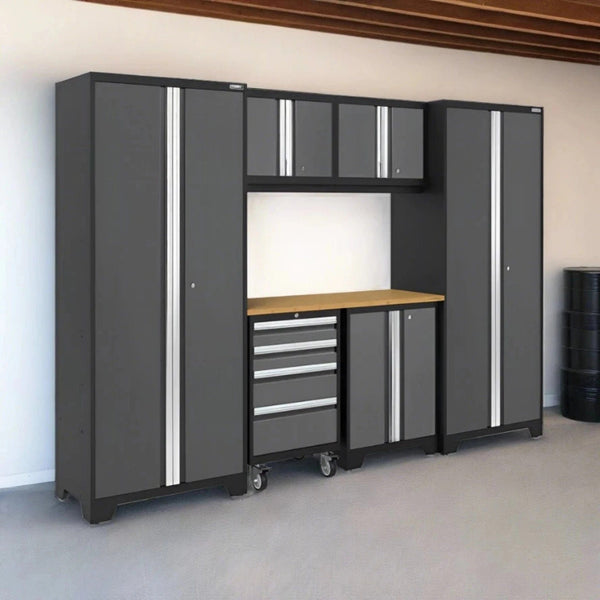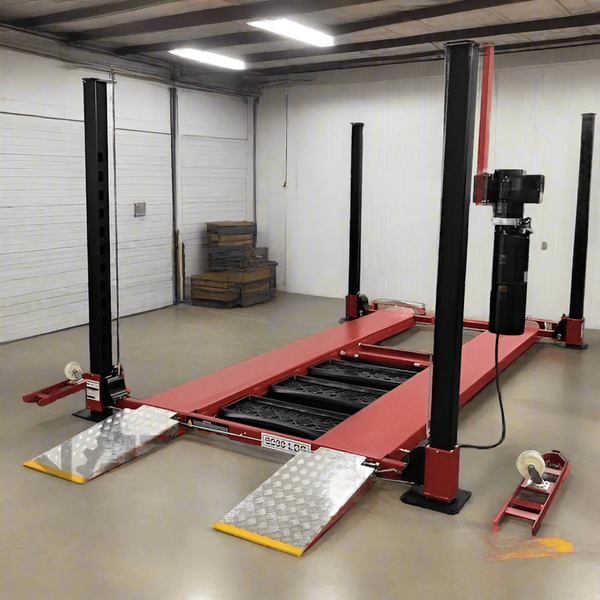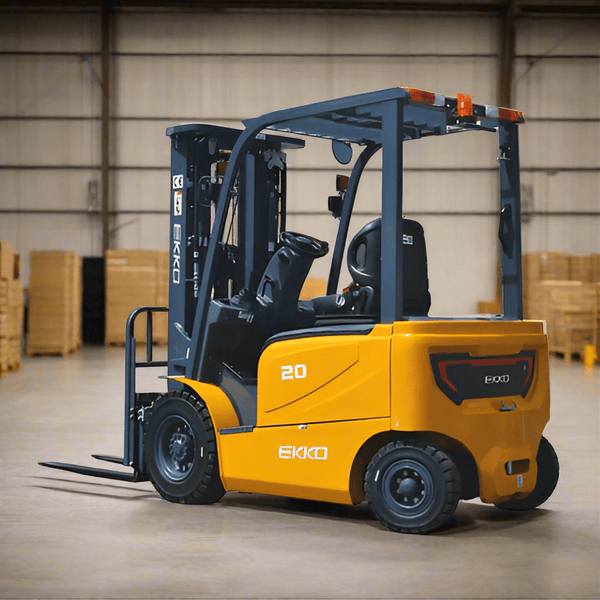
Mohawk vs Atlas Two-Post Lift Comparison
So many customers come to us asking for guidance on the Mohawk vs Atlas car lift comparison - and we get it. These are two really popular manufacturers in the industry, so we’ve put together this Mohawk vs Atlas two-post lift comparison to break it all down.
Mohawk lifts are made here in the USA and are known for rock-solid construction with a heavy steel design. They tend to have a long service life and are trusted by government fleets and commercial facilities alike. Every model, from the A-7 to the TP-20, is built to perform.
However, we carry Atlas Automotive Equipment because this brand delivers professional-grade performance at a price that actually makes sense for most garages. They’re built strong, certified for safety, and far easier to install and maintain than heavier commercial models.
In looking at the Mohawk vs Atlas two-post lift lineup side-by-side, it becomes clear which is the ideal fit for your shop. And whether you’re shopping for a residential or commercial garage, that’s probably Atlas. Learn more about why My Garage Supplies is the #1 choice for your car lift for garage. Get in touch today for one-on-one support picking the right equipment!
Mohawk vs Atlas Two-Post Lift Comparison At a Glance
|
Feature |
Mohawk Two-Post Lifts |
Atlas Two-Post Lifts |
|
Lifting Capacity Range |
7,000 lb – 30,000 lb (heavy-duty commercial use) |
8,000 lb – 15,000 lb (ideal for most home & light-commercial garages) |
|
Construction & Design |
Massive all-steel frames, forklift-mast columns, fully hydraulic system |
High-grade welded steel with dual-point safety locks and low-profile pads |
|
Installation Requirements |
Requires 6.5″ + reinforced slab and higher ceilings (12–14 ft typical) |
Fits standard 4–6″ slabs; available in base-plate or overhead designs |
|
Maintenance & Operation |
Low-wear hydraulic system but requires professional service and parts sourcing |
Simplified hydraulic system; easy to service with readily available components |
|
Typical Price Range |
$10,000 – $25,000 + depending on capacity |
$3,000 – $8,000 range, strong ROI for most users |
|
Ideal Application |
Fleet, dealership, and government facilities needing nonstop heavy-duty lifting |
Independent shops and homeowners needing dependable, affordable daily use |
Why We Carry Atlas Car Lifts
Atlas is among the most respected names in automotive equipment, and it has been that way for decades now. The company is known for building reliable, well-engineered lifts for both professional technicians and home garages.
Atlas offers a wide range of lift types to suit different workflows. Their two-post lifts are available in both baseplate and overhead designs, covering capacities from 8,000 to 15,000 lbs. So whether you’re servicing sedans, SUVs, or light trucks, there’s a 2-post car lift for you.
Although our Mohawk vs Atlas two-post lift comparison will stay pretty focused on this style, it’s worth noting that Atlas also manufactures premium 4-post car lifts that extend capacity to 18,000 lbs. These are great if you have storage and alignment needs as well. The brand also makes car scissor lifts, motorcycle lifts, and so much more.
Variety aside, we carry Atlas car lifts because they hit the sweet spot for most shops: they’re super durable, safe, and affordable, all at the same time. Every lift is built from heavy-duty steel, has automatic safety locks, and provides years of dependable use with minimal maintenance.
These lifts are easy to install, too. They fit standard ceiling heights and come backed by strong parts support across the US. You can’t go wrong with Atlas lifts, and there’s no better place to buy yours than right here at My Garage Supplies. We stock the full range and back up your purchase with world-class customer service before, during, and after the fact.
Get in touch today and we’ll help you pinpoint the perfect Atlas lift for your workflow. You can also learn about Bendpak vs Atlas lift or Titan vs Atlas lift in our blog. In the meantime, let’s introduce the other half of our Mohawk vs Atlas car lift comparison below.
Are Mohawk Car Lifts Good, Too?
We don’t carry Mohawk lifts, but that’s not to say they don’t bring anything special to the Mohawk vs Atlas two-post lift comparison. The brand has been manufacturing lifts since 1981, serving the commercial market well over that span.
Mohawk proudly designs, welds, and manufactures every lift it sells right here in the USA, and that’s definitely something we can get behind. The product line includes two-post lifts, four-post drive-on runways, mobile column lifts, and vertical-rise tracks. Two-post lifts alone span from 7,000 to 30,000 lb capacity, while mobile column systems go up to 240,000 lb!
As you can imagine, these lifts are crafted with thick steel construction, dual-cylinder hydraulic designs, and all-position mechanical safety locks so you can enjoy peace of mind even amidst continuous commercial use.
The benefits of Mohawk lifts are clear: you’re getting industrial-grade durability built for heavy workloads, a strong warranty program, and a manufacturer experienced in servicing fleets, government facilities, and high-volume shops.
There are some limitations to consider, though. The most obvious is cost. The pricing and footprint are higher than what many light-commercial or residential garages need. Installation is a bit more demanding, too. The concrete slab you anchor Mohawks lifts into has to be really thick. You’ll need high overhead clearance and substantial structural support.
These things aren’t exactly dealbreakers for some commercial shops, but they are for others - and that’s where Atlas lifts make sense. But which is right for your specific operation, between a Mohawk vs Atlas two-post lift? Let’s compare the two side-by-side below.
Mohawk vs Atlas Car Lift Comparison: Which is Right For You?
We want to be clear in saying both Mohawk and Atlas build capable two-post lifts with solid reputations. There’s overlap in safety, day-to-day reliability, and the kinds of vehicles they can service.
The key difference, however, shows up in construction style, site requirements, capacity ranges, and total cost of ownership. Here’s a thorough Mohawk vs Atlas two-post lift comparison.
Build Quality and Construction
Mohawk uses very heavy steel, forklift-mast-style columns, large-bore cylinders, and leaf-chain lifting. Assemblies are overbuilt for continuous commercial duty and abuse in fleet settings. Even the welds, base plates, and carriage components are massive. This is great for rigidity and peace of mind, but it adds weight, installation complexity, and as you’ll learn below, cost.
On the other hand, Atlas uses robust welded steel columns and carriages sized for common passenger vehicles, SUVs, and light trucks. You still get thick steel sections, automatic arm restraints, and dual-point safety locks, but in a form factor that’s easier to deliver, position, anchor, and maintain in standard garages. Atlas feels “plenty stout” without the industrial heft.
Lifting Capacity and Range
This is one of the main distinctions in our Mohawk vs Atlas two-post lift comparison: capacity.
Mohawk two-posts span roughly 7,000-30,000 lbs. Many models are tailored to heavy trucks and commercial chassis. That’s great if you regularly service medium-duty work trucks or operate a fleet bay. Otherwise, it might be overkill.
In contrast, Atlas sits in a tighter capacity range of 8,000-15,000 lbs across base-plate and overhead designs. That’s the sweet spot for general service, and usually just fine for sedans, crossovers, full-size SUVs, and most half-ton pickups.
Certification and Safety Features
Both brands offer ALI-certified models and integrate mechanical locks, arm restraints, and parachute-style hydraulic protection. You’re getting a lift you can trust, whether you choose Atlas or Mohawk.
Atlas delivers all the protections shops expect - that includes dual-point locks, automatic arm restraints, and low-profile pads, without the cost/weight of heavy-fleet engineering. However, Mohawk leans into redundancy and industrial safety details suited to 10-hour duty cycles.
Installation and Space Requirements
This is another key difference in our Mohawk vs Atlas car lift comparison - installation.
You need to figure out whether or not your shop can actually accommodate a Mohawk lift, since they call for thicker slabs (~6.5” concrete on certain heavy-duty models), wider base plates, and higher clearances (12’-14’ ceilings are common in specs.). There’s more complexity associated with delivery, placement, and anchoring.
Atlas tends to integrate into more shop environments, as most models only need a 4”-6” slab. You can choose from both base-plate (low-ceiling) and overhead options to work around obstructions, too. You get more flexibility with Atlas, which is a huge benefit.
Cost of Ownership
Like we said from the start, the extra manufacturing lengths Mohawk goes to are reflected in the upfront price. These lifts are often five figures even before electrical, slab work, and installation. Long life is a given, but you’re paying for industrial capacity that may not get used daily.
Atlas typically lands in the $3,000-$8,000 range for two-post lifts, which is much easier to stomach for most shops. Parts are widely available, wear items are affordable, and routine service is straightforward.
That lower entry cost plus easy upkeep is hard to beat over a 5-10 year window when your workload is standard passenger vehicles. It’s also worth noting that we make financing a breeze here at My Garage Supplies!
Brand Support and Warranties
Mohawk supports government, utility, and fleet accounts with documentation, engineered drawings, and deep technical assistance. That’s great for large facilities with formal maintenance programs. But it can get a little convoluted in some cases.
That’s part of why shops, even if they have the budget for a Mohawk lift, prefer Atlas lifts. You get accessible parts pipelines, clear install guidance, and responsive tech help.
As for warranties, Mohawk two-post lifts have one of the strongest in the industry: 25-year structural, 10-year mechanical, and limited lifetime hydraulic cylinder seal warranties are all available.
Atlas offers a simpler warranty covering 2 years on structural components, 2 years on hydraulics, and 1 year on the power unit. However, these lifts are built to last - and we rarely have customers calling us about warranty issues!
Wrapping Up Our Mohawk vs Atlas Two-Post Lift Comparison
We hope this Mohawk vs Atlas two-post lift comparison has left you clear on the most important differences between these brands and the equipment they manufacture. Both are exceptional, but only one is right for your garage.
The key takeaway is that Atlas tends to be the smarter investment for most garages. You get the lifting power, safety, and build quality professionals need, without the weight, cost, or installation demands of an industrial system. These lifts fit real-world shops and home garages.
Our blog has similar resources comparing the Atlas vs Triumph lift and AMGO vs Atlas lift lineups if you’re interested. But at this point, why not take the guesswork out of picking the perfect lift for your workflow? A personalized recommendation is just a click or call away.
Get in touch with My Garage Supplies and we’ll talk over your shop, your budget, and other factors to figure out what brand and model makes the most sense. Upgrade your garage with our guidance today!



